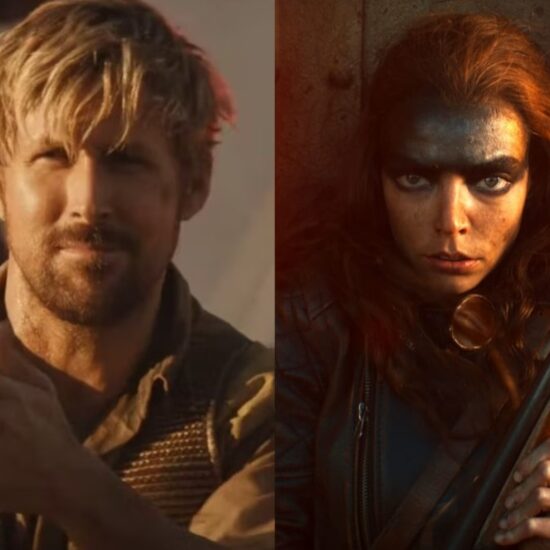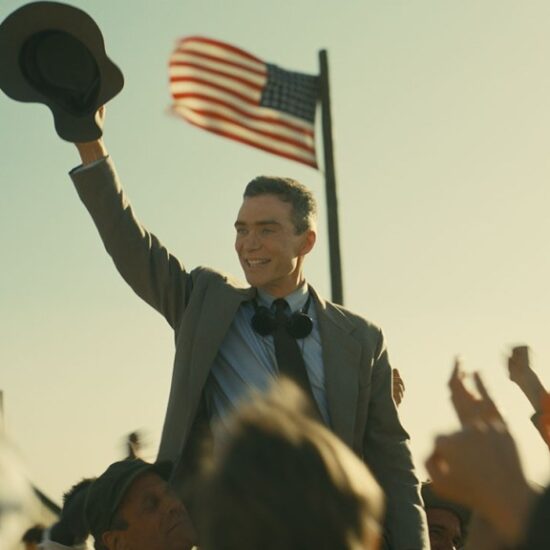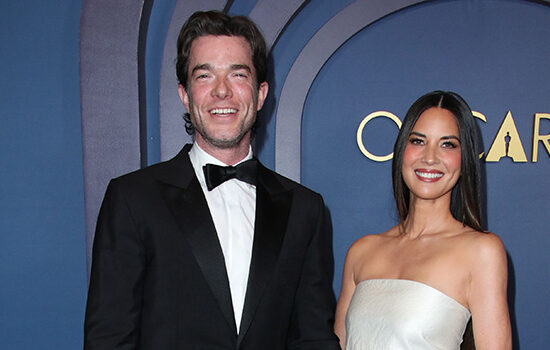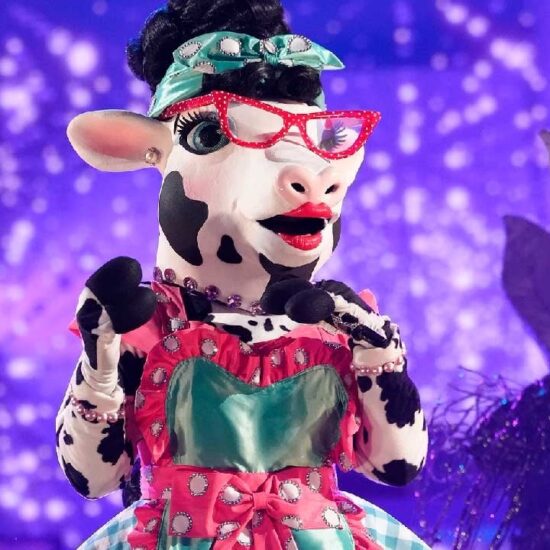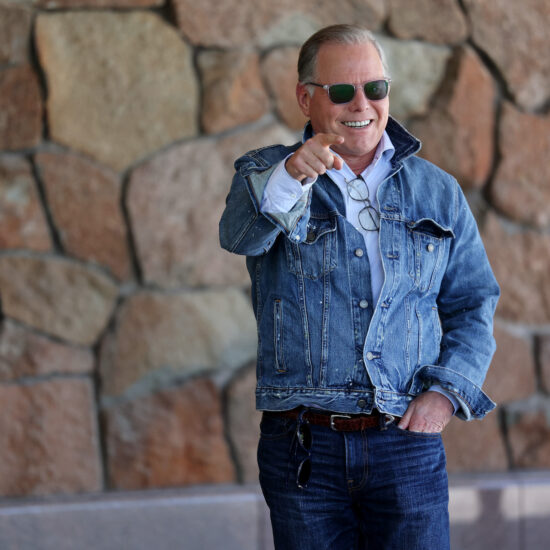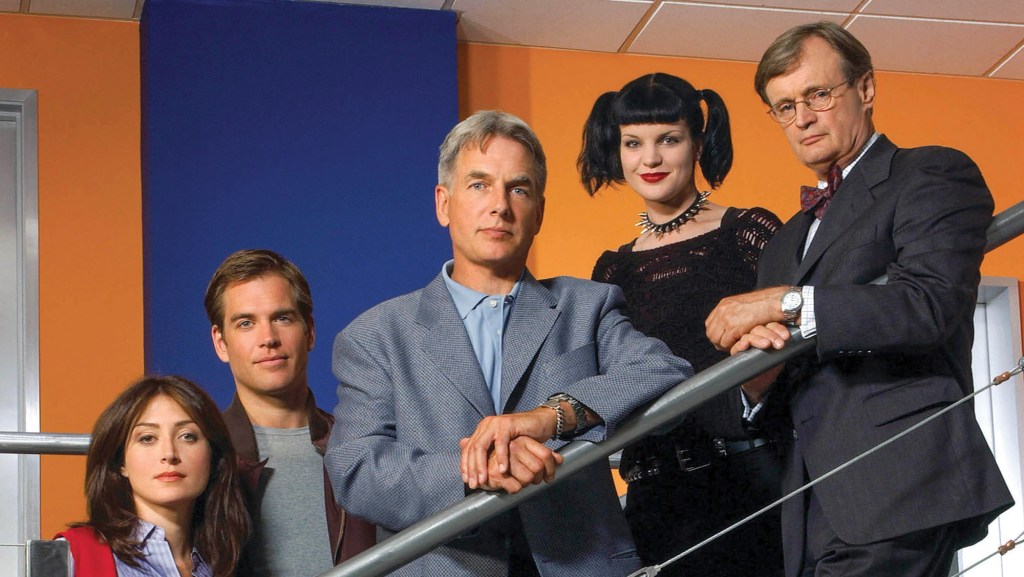
Although NCIS was well liked from the get-go, not even an elite investigation could have foreseen the show becoming a hit that would span decades and launch a franchise.
It began in spring 2003 as a backdoor pilot for CBS’ sturdy military-law procedural JAG. Co-created by JAG mastermind Donald P. Bellisario (Magnum, P.I. and Quantum Leap) and Don McGill (Numbers, CSI), NCIS follows special agents from D.C.’s Naval Criminal Investigative Service, led by Mark Harmon as Leroy Jethro Gibbs. The show’s initial core cast included Michael Weatherly (Tony DiNozzo), Sasha Alexander (Caitlin Todd), Pauley Perrette (Abby Sciuto) and David McCallum (Ducky Mallard). Twenty years later, the series continues to thrive, as it stands as CBS’ No. 1 broadcast drama for five straight seasons and has launched four spinoffs, with the first international entry, NCIS: Sydney, debuting this fall on the network.
In celebration of the series premiere that aired Sept. 23, 2003, The Hollywood Reporter sat down for an oral history with the creative forces behind the show’s impressive run. This includes Bellisario and McGill, in addition to fellow executive producers Charles Floyd Johnson and Mark Horowitz, CBS Entertainment president Amy Reisenbach and former presidents Nina Tassler and Glenn Geller, CBS Studios president David Stapf, former CBS head of casting Peter Golden, casting director Susan Bluestein and others.
Among the topics discussed include how Harmon stood out among a high-profile list of potential candidates for Gibbs, the circumstances surrounding Bellisario exiting the show, the much-discussed — and sometimes controversial — departures of its initial stars and more recent additions like Cote de Pablo (Ziva David), the politics of its viewers, why NCIS would be much different had it launched on a streamer and how it gets fans to keep coming back amid all the changes.
David McCallum and Mark Harmon on NCIS
Courtesy of CBS
“CASTING WAS VERY CHALLENGING”
Donald P. Bellisario and Don McGill created the series as a two-episode backdoor pilot to air during their show JAG. There was a lengthy list of names considered to play the show’s leader, Leroy Jethro Gibbs, before Mark Harmon landed the part.
Charles Floyd Johnson, executive producer on JAG and NCIS: Because JAG was so successful and had gone nine seasons, the network and other people were saying, “Don, you should really spin it off into something else.”
Donald P. Bellisario, JAG creator and NCIS co-creator: I took two JAG episodes and worked NCIS into that. JAG was the springboard for it.
Don McGill, JAG producer and NCIS co-creator: Don Bellisario gave me my first job on JAG. I had been working on JAG for a couple years when he said he wanted to create a show with me, which was kind of a shock and surprise, but I was super grateful for the opportunity.
Mark Horowitz, JAG director and NCIS executive producer: The show was originally pitched as Law & Order in the Navy. First, there’d be some crime, and the NCIS agents would investigate it — the cops of the Navy — and then the JAG people would come in and try the case. Don played with that idea for a little while, and then he just said, “We’re not going to do that. It’s going to be two completely separate shows.”
Johnson: When the two-parter was finished, the strength was really the first half-hour with the investigation. And Mark Harmon just made a big impression. They started testing it, and the first half-hour tested so well that [then-CBS head] Les Moonves said, “Why don’t we just make it all investigation?” So that’s how it came about.
Amy Reisenbach, CBS Entertainment president: You’ve got to give so much credit to the writers. They wrote real people.
Johnson: I know Harrison Ford was a name that everybody thought about for Gibbs because he was so perfect. But I don’t think it ever got further than, it was a name thrown out.
Peter Golden, former head of CBS casting: [On] Harrison Ford — when you sit down, and you have an initial conversation about casting, no name is off the table. Back in the early 2000s, the Harrison Fords of the world [rarely did TV]. But that didn’t mean you didn’t put them on the list.
Susan Bluestein, NCIS casting director: I don’t remember Harrison Ford. There were names like Alec Baldwin, Chris Cooper, Clive Owen, Kevin Bacon, Tom Berenger, Val Kilmer, Charlie Sheen, Aidan Quinn, Patrick Swayze. We did not make offers to those people. We just investigated.
Johnson: I remember Scott Glenn was mentioned, and he was considered very strongly.
Bluestein: Scott Glenn, yes. And Scott Glenn was also being considered for the role of Ducky. There was a lot of discussion about Scott Glenn, and ultimately Scott Glenn passed. And other people passed for Gibbs.
McGill: Andrew McCarthy at one point was in the mix for Gibbs. He and Don Bellisario met and talked over the role.

Mark Harmon and Pauley Perrette on NCIS
Courtesy of CBS
Bluestein: Casting was very challenging. I cast Mark Harmon to play John Dillinger in a movie of the week in 1991, and he was terrific. Mark had been on my NCIS list from day one. I always felt like Mark really had the gravitas for this character.
Golden: Susan said, “What about Mark Harmon?” Mark was a big deal, and everybody thought, “We’ll make an offer to Mark Harmon, and when we don’t get him, let’s go through the list of who else we could get.” Mark had a meeting with Don Bellisario, and they hit it off, and Mark agreed to do it. All of a sudden, the show took on much more importance in my mind.
Bluestein: Don wasn’t completely sure [about Mark]. He hadn’t seen a lot of Mark’s work. I felt like I could turn that around.
Bellisario: The kind of character he played in other roles made it fit for this.
Johnson: Sasha Alexander wasn’t in the two-episode pilot. It was an actress by the name of Robyn Lively [who is Blake Lively’s older half-sister]. They liked her, but they didn’t think she quite worked. And so when the series got picked up, CBS said, “We’d rather move on.” And then we went in search of a character, and Sasha came in at the last minute. I loved Robyn Lively, but those things do happen.
Glenn Geller, former CBS Entertainment president: Don Bellisario really understands the particular attributes to put on a character that make them stand out. They are kind of stock characters, but he always infuses it with some attribute that really makes them special.
Johnson: I think Jennifer Aniston was available at the time, and her name was floated.
Bluestein: I don’t remember ever offering it to Jennifer Aniston. Jennifer Aniston could very well have been a name that we discussed.

Michael Weatherly, Brian Dietzen, Pauley Perrette, Mark Harmon, Cote de Pablo, Sean Murray, Rocky Caroll and David McCallum in 2012
Amanda Edwards/WireImage
McGill: Don Bellisario said to me he wanted the show to have a lot of humor, which is where the Abby character came from. I was a huge fan of CSI, and I loved the Greg Sanders character. So I thought creating a quirky lab character, and pushing it a little bit further, would satisfy Don Bellisario’s mandate to bring humor to the show.
Golden: Personally, I loved Pauley Perrette as an actress, but I thought, “Boy, this does not feel like someone who works in a lab.”
Bluestein: I loved Michael Weatherly. But he happened to not be available because he was in Australia [playing Robert Wagner for ABC’s] The Mystery of Natalie Wood. Don was also going to Australia and had a place there, and they went out to dinner. And, of course, later on Robert Wagner would end up playing Michael Weatherly’s father in the show, which was really ironic.
Golden: Pauley Perrette, David McCallum, Michael Weatherly, they all came in and read, and when they read, it was undeniable. And I don’t want to underestimate how great Rocky Carroll (Leon Vance, who joined in season five) was.
James Whitmore Jr., director on JAG, NCIS and three spinoffs: When they cast David McCallum as Ducky, the studio said, “No way, we’re not casting this old character actor in the role.” And Don [Bellisario] said, “If you don’t, we’re not doing the show.” He was that serious about it. The studio went with it, and of course, David McCallum is gold.
Golden: I think it was because David McCallum was British. The feeling was, “Can you do that?” This was such an American show.
David Stapf, CBS Studios president: I felt like the show was probably not going to do as well globally because it was about an American unit of the military. So why would other countries embrace it? But I do think back to the universality of good versus evil, and caring about the people.
McGill: In that first year, understandably so, the CSI folks were not too happy about us bringing out a show called NCIS — a crime show with forensics. So it was decided that, at least in that first year, to differentiate, it was called Navy NCIS, which is a little bit redundant. But it assuaged the concerns of the folks at CSI.
Nina Tassler, former CBS Entertainment president: The show really was so strong out of the gate. You had incredible chemistry between the cast, and there was a tone and a sensibility to NCIS that other procedurals couldn’t quite hit.
McGill: I developed the show with Don, wrote the two-hour backdoor pilot out of JAG, and then I wrote a couple of the first episodes of the season. Without going into stuff I’d rather not talk about, Don and I had a falling out. Our relationship became strained. He saw things differently from me. Since he was the boss and a very successful producer, I thought it was best for me and the show that I leave and move on, which is what I did.

Mark Harmon and Donald Bellisario in 2004
Mathew Imaging/FilmMagic
“HE’S A VESUVIUS OF A MAN”
The series got off to a solid start but didn’t flourish in the ratings until the third season, which followed the shock of Sasha Alexander getting unexpectedly killed off at the end of season two. In the early years, the show had an arduous shooting process, with Bellisario known as a perfectionist. He exited in 2007.
Golden: We were only able to make a deal with Sasha for two seasons. She decided she wanted to move on to other things, and that left a gaping hole because she was an important part of the show.
Johnson: In year two, Sasha went to Don and said, “I love this show, but I just can’t work this hard.” We were doing long hours. I don’t think she wanted to leave the show — she just wanted a lighter workload. Bellisario was always a writer who went for the cataclysmic. He went, “Well, what if we kill her off?” Everybody goes, “What?” And he went to her and told her, “Good news — your workload is going to be lighter. But you’re going to die.” (Laughs.) It was the very last minute or two of the show — the shot through the head. That’s always been one of the more shocking things on the internet of endings that you don’t see coming.
Bellisario: I wanted to do a shocker, so that’s what I did, and people didn’t expect that at all. It came out of nowhere.
Horowitz: We’ve had a number of circumstances over the years where we’ve had to keep a secret from the audience, and that was the very first one. Only one script page of her being shot was ever printed, and they read it in person, and it was returned every time. The film was broken off from the rest of the film shot for that day. Also, we actually shot an alternate ending. Even my wife didn’t know. (Laughs.) We were watching the show, and [Caitlin] got shot, and she just jumped out of her chair.
Geller: I wasn’t surprised when the series ended up on the air, but I don’t think it was really NCIS in its first season. It took a couple of seasons to really become something.
Horowitz: At the end of their third seasons, both JAG and NCIS were sold to USA Network, where they started running them 24 hours a day. That’s when the network ratings went up, and we moved up to this No. 1 position.
Bellisario: I didn’t realize [that it was a hit] for a while, but when I did, it was a great feeling. I shouldn’t say it was surprising because it was a good show, so I knew it would do well, but I was a little bit surprised by it.
Johnson: Bellisario was very creative and wonderful, but he was a tough taskmaster. I got along with him, thank God, or I don’t think I would have lasted that long. But the reality was that if he didn’t like a script on the day that we were getting ready to start to shoot, he would just tear it apart. He would just start all over again. You’re looking at it, and you’re going, “Oh, God, the cost of this, the budget, nobody’s going to know their lines.” But that’s who he was. His feeling was, if it’s not a good script, you can’t shoot it. But ultimately, down the line, that caused problems with the cast and with Harmon.
Whitmore: Don’s a volatile character. Like a lot of creative people, he’s a Vesuvius of a man. We had done a bunch of Quantum Leaps together, and then I had done a pilot with him that had not gone well. I just said, “I don’t want to do this anymore.” So I stopped working with him. But he did JAG, which was very successful, and I did a couple of those. Then I was doing 24, and Don loved that show’s style. He wanted me to come over [to NCIS]; against my better judgment, I said, “OK, I’ll work for Don again.” I started with the eighth episode of season one. I got hooked immediately, and I kept coming back.
Johnson: Mark Harmon is a lovely man, but he has a very strong, male, no-nonsense point of view in terms of who he was. I think that’s what drew Bellisario to Harmon, and he may have seen some of his own personality in Harmon as well. Harmon had a reputation in terms of his work ethic of always being on time, always hitting his marks and always being supportive of his crew.
Horowitz: Mark Harmon is an extraordinary actor, a wonderful human being and a wonderful person to work with. He was the captain of the acting team.

Mark Harmon and Sasha Alexander on NCIS
Courtesy of CBS
Johnson: Eventually, actors felt like they would get two acts or one act, and they didn’t know what their arc was for the show. They couldn’t figure out their lines. It was a very complicated show in the beginning. And so when we got to about year four, Harmon just felt like it was too hard. He never said to anybody, “Get rid of Don.” He just said, “This is too hard to work this way.” Eventually, the network went to Bellisario and said, “Maybe you should work from a distance from it and not be quite as involved in terms of the way you work.” And so Bellisario, by the fifth year, was gone.
Bellisario: It was just time for me to move on and do something else. I had done enough on the show, so I stepped away. It was my decision.
Johnson: I was in the middle a lot. I was able to walk the line, and work with Harmon and work with Don. It was not easy, but I was able to do that. I sometimes felt, when the train went off the track, I was the person who had the responsibility of getting it back on and keeping everybody together. But I have great respect for Don. Without him, there would be no NCIS. The two strongest people who got that show up and running in terms of keeping it what it was, would be Bellisario and Harmon.
Whitmore: Mark Harmon is just a solid pro, committed to the work. He is completely creative, never stops working, never stops supporting the other actors, demands everybody showing up there ready to go, just like he is. He doesn’t mess around.
McGill: I just know what I was reading in the trades. (Laughs.) I know that Mark was not happy, and that he and Don, their relationship became strained. I don’t know much that went on behind the scenes because I wasn’t there. It’s just one of those things that happens, the classic Hollywood creative differences.
Bluestein: I always had a special fondness for Don because he was very, very good to me. I was always very grateful to Don.
Horowitz: He was definitely the leader — the creator of the show — and I think there was always a question mark in people’s minds: How would it proceed?
Johnson: That was hard for all of us to believe because he had always been so intricately involved in every show, and he established so much of the pattern of the characters. I became the showrunner for a while with Shane Brennan, but I wasn’t a writer per se. Eventually, we brought in a couple of writers to run the show from the creative standpoint. But I was very lucky. I had been there for so long and had great relationships with everybody, so I was able to stay on and be a useful producer for them. Obviously, it worked because I’m still there. (Laughs.)

Mark Harmon, Cote de Pablo and Michael Weatherly on NCIS
Sonja Flemming/CBS
“WHEN COTE LEFT, LITERALLY THERE WAS A RIPPLE IN THE UNIVERSE”
After Sasha Alexander’s departure, Cote de Pablo joined the series in the season three premiere as Ziva David. Her exit in season 11 presaged a number of high-profile goodbyes, including those of Michael Weatherly, Pauley Perrette and Mark Harmon.
Golden: Susan delivered Cote de Pablo, who was just a home run. I remember she walked in the room, and we all were like, “Oh, my God, who is this woman?” Which doesn’t happen now that much at network tests.
Bluestein: I had loved Cote for a long time from a series called The Jury. She was just so unique, and then she read with Michael, and the chemistry was instantaneous.
Golden: I’m not sure Don Bellisario was 100 percent on board [with Cote] right away. Not that he didn’t love her, but I think he had another choice that he felt was righter for the role. But everybody was so enthusiastic about Cote that he came around.
Geller: The first time I met Don, we had lunch in 2006, and he actually talked about the character of Ziva the entire time and why she was going to be so popular.
Horowitz: In the beginning, she wasn’t necessarily as popular as she was when she left. I just remember thinking, “Huh.” It took time for the audience to be involved in the relationship between she and Tony and really appreciate her kickass status.
Johnson: With Cote, I think she had gotten to a place where she wanted to move on. She did eight years on the show, and I had a conversation with her about a year or two before she left, and she said to me, “I don’t know if I want to do this forever, and at some point, I think I might leave.” And I said, “Oh, Cote, please, come on. It’s such a successful show. What are you going to do? You should ride this horse all the way to the gate.” And she said, “No, I don’t think so.” So I didn’t believe it.
Tassler: When Cote left, literally there was a ripple in the universe. But again, the show found its way forward.
Johnson: Emily Wickersham (Eleanor Bishop) came in, and hers wasn’t an easy transition from Cote de Pablo because Cote was such a strong character. Audiences liked [Cote], but eventually Emily won out. But I remember it was a little bumpy with her, where you’d get mail, and people would go, “She’s no Cote de Pablo.” Well, we wrote her very differently for that reason.

Jennifer Esposito (Alex Quinn), Emily Wickersham and Mark Harmon on NCIS
Michael Yarish/CBS
Golden: I was really thrilled that Maria Bello (Jack Sloane) went in for a while. Maria was somebody who we were always trying to get to do something. We needed that female lead because Cote was leaving, and it just worked out.
Geller: When Michael Weatherly left, my entire goal was to get him to stay on CBS, and I did. I was thrilled because I knew America loved DiNozzo, and I wanted him to be a part of Bull. When a series loses a major character like that, there’s always a hole. But the writers always managed to really find a way to not plug the hole, but to massage the characters and the relationships so that you were being introduced to new ones, and you still got to love the ones that are there.
Horowitz: When Michael Weatherly left, I thought, “We’re done. How could we go on?” And yet Wilmer Valderrama (Nick Torres) comes in and creates his own persona, and he’s got his own thing.
Johnson: In Pauley Perrette’s case, there was an incident with the show with a dog. The dog was Harmon’s, and apparently the dog bit someone. Pauley was a huge, huge SPCA [Society for the Prevention of Cruelty to Animals] animal person. And then the dog kept coming with Harmon, and she felt it wasn’t safe for the show. By the end of that year, she just felt like it wasn’t working for her anymore, and it was time to move on.
Whitmore: Diona Reasonover (Kasie Hines) is wonderful and brilliant, and the work is great. But you walk onto that set sometimes, and you miss Pauley.
Geller: Pauley Perrette made Abby one of the most beloved characters on television in the 21st century.
Johnson: There’s a joke sometimes where people would say, “You never know who’s going to survive on NCIS.” Because Lauren Holly (Jenny Shepard) was there, and she went that way, and a couple of others. And some fans complained that it was always women who went faster than the guys. But it did keep audiences’ attention. Lauren Holly had signed on, and she didn’t expect to stay there forever, but I don’t think she expected that she was going to leave that way.
Horowitz: Gibbs lost the love of his life — she was killed, and he’s never found anybody he ever loved again. Throughout the course of the series, we would introduce potential female suitors, and those were always met with disdain [from fans]. (Laughs.) That happened consistently. None of them were good enough for him, and we always thought that was very funny.
Johnson: There was a character that Muse Watson played where he was an old NCIS investigator who would come and go. He loved the show, and he’d come in two or three times a season, and he ended up getting killed. I know he was very unhappy. (Laughs.)
Horowitz: In the last scenes of an episode, if people were moved emotionally in some way, that’s the feeling they’d be left with. Sometimes that involved getting rid of somebody that you really liked. Gibbs’ best friend, Mike Franks (Watson) — terrific actor. He did a bunch of shows with us. Well, yeah, he didn’t live real long.
Johnson: We thought [Harmon leaving] was the death knell. Coming in at 6:30 a.m., five days a week, and being the major character that was the linchpin — that’s pretty tough, and he did it for 18 seasons. He had just gotten to the place where he was getting close to turning 70, and he wanted to spend time with [wife] Pam [Dawber] and his kids. So he was leading up to it. It started probably [with him dropping hints] around the 15th or 16th season. But he was so loyal to that crew and so supportive of the show. He was very proud of it, and he stayed on longer than he even intended.
Whitmore: When Harmon was talking about leaving, and there was this chance that he might not come back, I said, “How are they going to replace this dude?” And they brought in the one guy that could do it, which was Gary Cole (Alden Parker).
Johnson: In the end, we hit gold with Gary Cole. There were a lot of names bandied about. When everybody finally decided we’d make an offer to Gary Cole, we didn’t pitch it to him as, “He was going to become the new Gibbs.” We pitched it to him that he was going to come in and wasn’t sure he was going to stay with the team, so that he didn’t have to feel like he was stepping into the shoes of someone who had been there for 18 seasons.
Horowitz: When Gibbs was in charge, he was the leader, and everybody was pretty much under him. When the Gary Cole character came in, it loosened up a little bit and allowed McGee (Sean Murray) to become a senior agent, and they have a little bit more authority. So it gave room for other possibilities.
Johnson: David McCallum doesn’t do that much in the series anymore. David [just turned 90], and he lives in New York. He may come back and do four or five episodes. It’s much too hard on him now, and I think he’s ready to retire. But he was amazing from the day he came on.
Horowitz: Gary [Glasberg, the executive producer who died in 2016,] was just an extraordinary talent — really talented writer and just a wonderful, wonderful human being. I look at him every day, and I think about him every day. He was such a great leader of this show and sorely, sorely missed.

Gary Cole, Sean Murray, Wilmer Valderrama and Katrina Law (Jessica Knight) on NCIS
Courtesy of CBS
“I SOMETIMES FONDLY REFER TO NCIS AS CHOCOLATE CAKE”
With NCIS renewed for a 21st season and CBS set to air its fourth spinoff and first international one, NCIS: Sydney, the franchise keeps going strong.
Horowitz: You could absolutely say that the show is popular amongst people who perhaps are politically conservative or live in more rural areas. But at the same time, we’ll go on a college campus, and everybody there watches the show, even in Southern California. Obviously, I think it’s more popular in the central states than on the coasts.
Johnson: During the Trump years, we just decided most of the time to stay away from the whole political thing, and we didn’t talk much about the president. We would talk about Secretary of Defense, Secretary of the Navy, that kind of thing. We veered away from that as much as we could.
Horowitz: We did an episode where Gibbs went to speak with Michelle Obama, and we shot it in the White House with her about a real-life program that helped military families to find doctors and housing. It was a very positive thing, and it really came out great, and she was fantastic. Some people really reacted very positively to the show, and then other people did not like seeing Michelle Obama on the show. (Laughs.) So we didn’t really dive into politics that much.
Diana Valentine, director on NCIS and two spinoffs: NCIS didn’t start getting these numbers and becoming the big hit until season four or five, and a lot of times 1695393735, studios and networks don’t let a show find its audience before it gets pulled — even more so with streamers. A streaming show would never go 21 years like this show has.
Reisenbach: [On whether starting on broadcast helped its legacy:] A hundred percent yes, in my opinion. It does touch so many viewers coast to coast and worldwide, and that really is because of the platform that it got on CBS, as well as how well it did when it went into syndication around the world. But it all started on linear, and that does have a lot to do with its longevity and success.
Tassler: NCIS was perhaps one of the cornerstones in helping shape the trajectory of the network. Even during its success, it never rested on its laurels.
Horowitz: I sometimes fondly refer to NCIS as chocolate cake. Everybody knows what chocolate cake tastes like, but you still want the chocolate cake.
Bellisario: It’s not so much about the stories. It’s about the characters and their relationship with each other, and that connects with viewers.
McGill: I don’t think it’s necessarily the kind of show that was out to get awards. It was really a show that was out to get eyeballs, and so I’m not surprised that it wasn’t ever really in Emmy consideration.
Johnson: I have been threatening to leave the show for a couple of years myself. A lot of people, including me, got force majeure’d this year, so my contract is ended. Everybody’s concerned about budgets and all this crazy stuff, so I may be just one of the casualties since I’ve been threatening to leave. So I’m just waiting to see. Once they do finally decide to find a solution [to the strikes], I think the landscape is going to change a lot.
Stapf: Speaking as the studio, I think it can go forever.
Reisenbach: Speaking as the network, I concur. I mean, it’s the No. 1 show.
Tassler: When I was at the network, we always used to say, “I’d much rather take ratings over reviews.” I’d much rather have a really devoted fan base, and that’s what that show has.
Johnson: We have not been told by the network, “Wrap it up at the end of the 21st year.” So I think it’s open-ended. We are proceeding as if we’re going to continue.
A version of this story first appeared in the Sept. 20 issue of The Hollywood Reporter magazine. Click here to subscribe.









